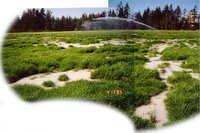The Washington State Department of Licensing (DOL) has submitted a requested Sunrise Review of Soil Scientists to the State House Commerce & Labor Committee. The report recommends that the practice of soil science be regulated.Members of the
Washington Society of Professional Soil Scientists (WSPSS) can find much to be proud of as well as cause for renewed vigilance in DOL's report. Soil science has been in DOL's sights before but the current set of events that led to the sunrise report started in 2001. That was the year that soil scientists became concerned that under the Geologists Licensing Act, practicing soil science would require being a registered geologist. Timely action by WSPSS resulted in an exclusion for the practice of soil. It also reignited WSPSS' interest in licensing.
Renewed efforts followed shortly in 2002 when soil reports prepared by a soil scientist were rejected by the Pierce County Planning Department. The planning department required a licensed geologist, consistent with a draft model Critical Area's Ordinance (CAO) being prepared by the State Department of Community, Trade & Economic Development (
CTED). Subsequent effort by WSPSS to revise CTED's Model CAO to include soil scientists as qualified to submit soil reports were initially successful but, for reasons that have not been determined, the soil science profession was not included in the
final draft.
Without licensing, soil scientists are failing in their efforts to maintain their professional standing with county planning departments, health districts and permitting agencies in Washingtonm State. Draft legislation to license the practice of soil science was submitted to both State Senate and House committees during the 2004/2005 legislative session. Lobbying efforts resulted in the House Commerce & Labor Committee request to the Department of Licensing to prepare a “sunrise� report that would define the reasoning and metrics underlying the request to be regulated.
An excerpt from that report:
Considerable evidence compiled in this report, through out-of-court settlements and litigation, show harm to property, health, safety and welfare of the public. Public health endangered by improper soil analysis ... has led to contaminated wells and groundwater; septic system failures; and compromised wetlands. Harm to the public exists when [action] is approved without a comprehensive soil analysis conducted by a soil expert to support decision[s] taken. Public harm occurs when ordinances excludes a professional group that hold an expertise through education and experience. Exclusion of a qualified group to practice diminishes choice. A significant number of court settlements indicate that there are professionals [who] practice soil science beyond the scope of their expertise. In view of the findings regarding the practice of soil science, the following recommendations [are] made for consideration by the Legislature:
- That Soil Scientists be regulated; and
- expertise should be defined to minimize overlap of work to be performed.
The sunrise report goes on to indicate that defining
what is soil science, and identifying
who is a soil scientist is a challenge. Furthermore, without a commercial yellow pages heading for the profession, consumer access to soil scientists is limited to an informal referral system. Professional soil science societies are viewed in the report as ineffective in protecting the public from unprofessional acts by soil scientists or purported soil scientists. Specific examples of damage are provided in the report, including at least $3,000,000 in damage claims
due to septic system problems in Cowlitz County in western Washington. Also cited were 20 cases in eastern Washington, provided to DOL by the Washington Department of Ecology, where earlier or more competent soil science consultation could have saved resources and protected human health.
Now that the sunrise report has been submitted, the legislature can move forward during the 2006/2007 legislative session to act on the previous draft. Prospects look good for passage, but regardless of the outcome, Washington soil scientists cannot help but be lifted up by the findings of the sunrise report: Practitioners of soil science are needed in Washington State to a degree that individual practitioners could not have been aware of. While it is extremely disturbing to learn of several instances of unprofessional work by purported soil scientists, it is good to read that quality work is highly valued and recognized as critical to protecting health and resources. Washington soil scientists already know that we are in some demand: once a soil scientist establishes a niche, it is rare to find that individual idle. DOL's survey offers us a unique glimpse into the bigger picture as to why that is.

1997 photo of sprayfield with soil problem.
Olympia Cheese. Lacey, WA.


